Monday, November 28
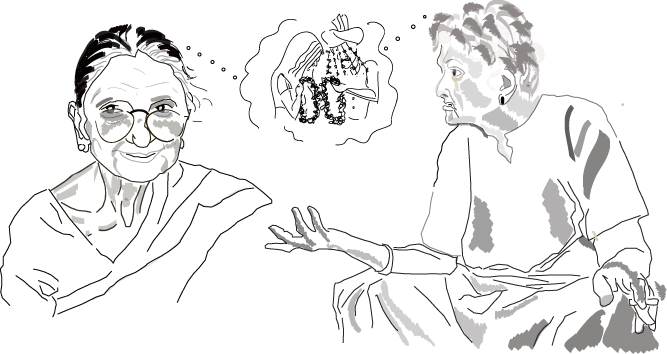
One of my favorite old ladies passed away last week. She was not a very close relative, but I saw a lot of her over the years and especially recently. In keeping with my odd series of room-mates lately (teenage model, geriatric dachshund), we shared a room for about a month and before falling asleep we used to chat and sometimes she would play with my hair, which was very grandmotherly and soothing. And sometimes she'd say the funniest things.
Like, she would read the paper from cover to cover and say with relish after, "I just love to read about the rapes and murders!" And when I had just come to India and was visibly morose at my changed circumstances, she recounted me a version of "The Prince and the Pauper" and then said with glee, "You put me in mind of the prince after he changed places with the pauper!" Another time, we were watching an Indian soap opera where there was a wicked mother-in-law who was trying to poison her son and get her daughter-in-law kicked out of the house before she could warn the son, and she said (as a joke) that I needed a mother-in-law like that to keep me in check. And then everyone pounced on her and said she shouldn't make jokes like that. But having made many jokes that have backfired in my life, I was interested to see that it can happen even at 82.
Like my surrogate grandmother from my maternal side, this old lady was also very concerned at my (lack of) marriage. Sometimes this would take the form of asking me to mentally search through the men I knew and see if I couldn't marry any of them. Other times, perhaps when she was more tired or fed up with life - she had recently had hip replacement surgery - she would say, "Everybody is doing something. What are you doing? You are just sitting there [and not getting married]." That second line of questioning was a little stressful; it would make me start thinking, "What am I doing? What am I doing?" But it was also nice that she cared.
Here is a little drawing in honor my recently deceased surrogate grandmothers. Now that they are no more, there is no one left to pester me about getting married. Sigh. One never knows what one has till it's gone.
I still have one (paternal) grandmother left, but though I love her lots, she’s past the stage of playing with one’s hair.
Thursday, November 24
"I
went to the Kashi Visvanath temple for darshan. I was deeply pained
by what I saw there … The approach was through a narrow and slippery
lane. Quiet there was none. The swarming flies and the noise made by
the shopkeepers and pilgrims were perfectly insufferable. Where one
expected an atmosphere of meditation and communion, it was conspicuous
by its absence. One had to seek that atmosphere in oneself … When I
reached the temple, I was greeted at the entrance by a stinking mass
of rotten flowers…"
-- Gandhi, on a visit to Benares, as quoted in Sunil Khilnani's "The
Idea of India."
You see? Everyone dislikes India at some point I think, Indian or otherwise, first visit or return visit. It's just the nature of the place. So there's no shame in the fact that I'm only just starting to like it. I don't want to exaggerate --I'm starting with five-minute increments of enjoyment here and there. It does make me worry though about how adaptable human beings are -- and I'm on the lower end of the adaptability spectrum -- and how all sorts of things you thought you could never make peace with, you do.
This line of thinking invariably leads to a a digression on how it is only the "insane," maladjusted people who continually see the world the way it actually is --and that's why they are the way they are. The rest of us are supremely sociopathic in that we just tune out the nastiness all around and go on our merry ways, going to work, putting money in the bank, thinking about what to eat and making small talk. Seriously though, if you spent a few minutes thinking about all the horrible things in the world, I mean really thinking, you couldn't live. But I'll stop here.
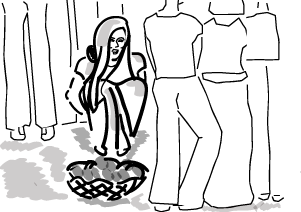 What
I actually wanted to write about was homesickness. I've more or less
realized that I'm the sort of person who always wishes to be what they're
not. So naturally any place I go to starts out at a disadvantage. After
years and years of being homesick as a child, it's become a generalized
state of being, such that even when I am in the place I spent so much
time being homesick for, I still experience unexpected bouts of homesickness,
which is a sort of disconcerting feeling.
What
I actually wanted to write about was homesickness. I've more or less
realized that I'm the sort of person who always wishes to be what they're
not. So naturally any place I go to starts out at a disadvantage. After
years and years of being homesick as a child, it's become a generalized
state of being, such that even when I am in the place I spent so much
time being homesick for, I still experience unexpected bouts of homesickness,
which is a sort of disconcerting feeling.
 The
most recent was when I bought an orange the other day from a fruitseller
by my office. Eating that orange with a chill in the air and wintry
sunshine all around vanished modern-day Connaught Place for a split-second
and I was back in my grandmother’s garden, after baths and before lunch,
eating oranges. It was exactly the feeling I had once in the Brooklyn
Botanical gardens when a sharp smell pulled me up short and I spent
several minutes walking back and forth till I found myself in front
of a lime tree just like the one my cousin and I used to make mud cakes
under.
The
most recent was when I bought an orange the other day from a fruitseller
by my office. Eating that orange with a chill in the air and wintry
sunshine all around vanished modern-day Connaught Place for a split-second
and I was back in my grandmother’s garden, after baths and before lunch,
eating oranges. It was exactly the feeling I had once in the Brooklyn
Botanical gardens when a sharp smell pulled me up short and I spent
several minutes walking back and forth till I found myself in front
of a lime tree just like the one my cousin and I used to make mud cakes
under.
I think the confusion is that sitting in the United States, I thought the place from whence all these smells came was an actual physical place, and now that I’m here, I realize it’s not a place you can go to. At least not on your own.
Sunday, November 20
 What
a lovely party I went to. Even in spite of the fact that everyone I
met had not one but two book deals in their pockets, or had published
highly acclaimed first novels. But I arose above my internal petty rivalries
for one evening and mingled energetically or, when because of odd shifts
of position I found myself in between groups, eavesdropped.
What
a lovely party I went to. Even in spite of the fact that everyone I
met had not one but two book deals in their pockets, or had published
highly acclaimed first novels. But I arose above my internal petty rivalries
for one evening and mingled energetically or, when because of odd shifts
of position I found myself in between groups, eavesdropped.
I mainly liked the party because I left knowing more people than I did when I walked in, which is not always the end result at a party. And because I felt relaxed and interested by whomever I was talking to at any given moment, and not as if I should be talking to someone else, which sometimes happens.
The other guests were mostly journalists and writers as well -- it seems like everyone is. India’s most famous foreigner was also supposed to come but didn’t.
I have tried very hard to remember snatches of the bits of conversation that particularly struck me at the time, but as I feared much of it has faded away. Here are some little bits that are left with me.
Conversation
1
Straight man: In India, men are…
Self: …from Mars, he he. (no response, pipe down)
Straight man: your male archetypes, Krishna, Shiva are not very masculine.
Gay man: True, Bhim and so on are not really models.
Straight man: In fact, there is no hypermasculinity in India.
Gay man: What about Shahrukh Khan?
Straight man: He's so gay.
Conversation
2
Journalist (not self): Sometimes I get very aggressive, but not, I mean,
in an inward way not an outward way.
Self: You're not aggressive.
Journalist: No, I'm actually kind of hyper. But in a really mellow,
chilled out way. Do you know what I mean?
Self: I love talking to you. But I must go to the bathroom.
Journalist: Please, can you get me a drink?
Conversation
3:
Writer: So then I went to the hakim and told him I was suffering from
premature ejaculation. But I wasn't, it was a lie.
Journalist (same as above): How do you know it was a lie?
Writer: Excuse me?
Journalist: You just said you haven't had much sex. So maybe you do
suffer premature ejaculation but you don't know it. So you're not lying.
Writer: I didn't say I've never had sex. I have had sex. A few times.
Well. You had to be there. Anyway, I now have several things to look for the next time I go to a bookshop. Here’s some of what youngish writers in India are producing in fiction, illustrated and not.
Friday, November 18
At long last I have been invited to a party. True, it is the party of someone who on our last meeting evoked great feelings of social and professional inferiority and envy in me, but beggars can't be choosers.
Actually, it's been quite an unusually social few days. Yesterday I returned to Olive with my fashion world aunty for a party being thrown by a designer who was creating one-of-a-kind sneakers for a well-known athletic shoe company. The result was very sparkly and delightful, what a cross-dresser might wear to a fancy-dress party, all pink and silver glitter and gold lamé.
We arrived
at the tail end of the fashion show but not too late for the free drinks
and snacks.
It was cheering to see that even in what seems such a sexually homogenous
society on the outside, the gay mafia --clearly a worldwide phenomenon
-- is alive and well. Most of the designers there and all the handsome
men were quite as gay as their New York counterparts, and then there
were your androgynous and sexually ambiguous types as well. Made one
feel quite at home.
The highlight of the evening was bumping into an old, old friend -- initially my sister's friend but now mine as well -- who introduced me to the people I usually read about in the weekend section of the paper. Two people told me that I look like Amrita Shergill, which I take as a compliment. I chatted at length with (to my mind) an unusually friendly fashion designer who commiserated with me about how unfriendly Delhi is and how glad she is to be only on the "fashion periphery." She made a point of telling me when she was leaving and saying good-bye, which I thought very kind, but twenty minutes later I spotted her chatting away animatedly with another fashion designer.
It was a far cry from the morning when I went on a field trip organized by a rainwater harvesting conference to various villages in Haryana. We went to a district called Mewat, which is apparently so painfully low on various social indices, that non-governmental organizations express shock and astonishment to find other non-governmental organizations working there. I supposed it's considered a gone case.
Still, I am continually amazed at how clean and beautiful farming villages are, even when their residents are considered the most backward of them all. I guess it's just one of the many ways in which the urban poor and the rural poor are different. I met one family that was harvesting rainwater from their roof and didn't have to go fetch water every day as they used to and another that had put in a squat toilet which, with a little water, empties into an underground pit system that’s good for 50 years. I thought it was very impressive and they seemed quite happy too.
We had only come from two hours away, but it was as if we were from another world for the villagers and vice versa also. The two things that struck me most is how every aspect of their lives involves so much physical work and how most of it is done by women. It was quite a nice day but still quite hot. What must it be like to walk two kilometers in the parching heat of summer to fetch one pot of water? People in the U.S. think I'm joking when I tell them that it's not uncommon for lots of people in India to have to fetch water several times a day. It's so strange how such disparate lives exist in the world. And in the same country.
Tomorrow I continue my social whirl by going to go eat roast boar at the Austrian embassy for the benefit of the physically disabled.
Tuesday, November 15
It's so easy to get lost here. Nothing is where I remember it being and landmarks are either gone or obscured by new signs, new bridges, flyovers or other construction. On Friday I spent an hour going to meet a friend (my only other one besides the dog) because I took a wrong turn and couldn't figure out where I was. Even once I had worked that out, I couldn't take the easiest way back it's not always clear on the map whether you'll be able to turn where you want to or not. Lots of places where you used to be able to turn have medians preventing you from doing that now, so you have to drive for ages to be able to turn. Instead I took a huge loop to get back to where I had to go, including several more wrong turns. Partly that's because I'm so confused by the flyovers --when the sign says what you want is straight ahead or on the right you have to go left and get under the flyover not go over it.
 I
probably would have kept going round and round the city if I hadn't
caught a glimpse of what has become my favorite sign in the whole city:
the flashing red and gold lights of the Golden Dragon restaurant. I
remember it being the marker we were arriving at my mother's best friend's
house when I was a child, and I still look for it all the time to see
if I'm arriving at or have overshot my destination. If it ever gets
torn down, I'll be bereft. I'll certainly never be able to find my way
anywhere again.
I
probably would have kept going round and round the city if I hadn't
caught a glimpse of what has become my favorite sign in the whole city:
the flashing red and gold lights of the Golden Dragon restaurant. I
remember it being the marker we were arriving at my mother's best friend's
house when I was a child, and I still look for it all the time to see
if I'm arriving at or have overshot my destination. If it ever gets
torn down, I'll be bereft. I'll certainly never be able to find my way
anywhere again.
To take a picture I had to turn from the peripheral road onto a crossroad and then when I was done reverse back on to Ring Road. But no one seemed to mind too much. I suppose that is one positive of being in a place with such lawless driving.
Sunday, November 13
Two dents and one chipped headlight later, I think I'm starting to enjoy driving in Delhi, albeit in a stressed, hyper-alert kind of way. I never played video games ever growing up, but some of the road obstacles and driving maneuvers here make me feel I'm playing one. Thusly I feel very victorious when I arrive at my destination and park, all in one piece. Bonus points for no new scratches.
Here are some general rules that I have found helpful to keep in mind, bearing in mind that this is a left-hand driving country (supposedly):
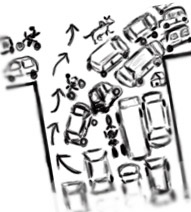 1.
Buses always have right of way.
1.
Buses always have right of way.
2. If you are a beginner, drive in the fast lane no matter how slowly
you drive. That way you can only be overtaken from one side.
3. As soon as you hit 60 kmph, be ready to switch lanes, since a large
cement block, speed bump or some other sort of obstacle is likely to
immediately appear the middle of the lane.
4. On any road where there is a right turn, make sure you are in the
left-turn lane if you want to go straight.
5. Conversely, in areas with a lot of cycle rickshaw traffic, you may
like to move to the center lane before making wide left turn in front
of said traffic, which tends to loiter on the corner.
6. Roundabout = Total Anarchy. Use turn signals generously. It is okay
to come to a complete stop once you've entered while waiting for other
cars decide where they’re going.
7. If you are a woman, do NOT try to overtake. Not even a bicycle.
In a separate achievement, I'm so proud of myself for writing about nostalgia without mentioning Proust and for writing about bureaucracy without mentioning Kafka.
Sunday, November 6
 Holidays
must be like sweet baked goods --as an adult you are always comparing
them unfavorably with the truly memorable ones you enjoyed as a very
small child.
Holidays
must be like sweet baked goods --as an adult you are always comparing
them unfavorably with the truly memorable ones you enjoyed as a very
small child.
I was sort of looking forward to this Diwali because it was the first time I spent it in India since I was eleven. I have a recollection --I don't know if it was from the last year I lived here or from a visit -- of driving around the city one Diwali and thinking the city looked more beautiful than I had ever seen it.
All the houses, none taller than two floors, were lit along their roofs, balconies and windows with tiny flickering diyas. I don't know what it is about that image that sticks in my mind, whether it was the number of lamps, or the uniform yellow glow, or the symmetry but it's that image that always comes to mind when I think of Diwali.
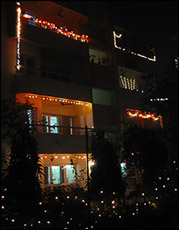 I
was hoping to see a similar sight this time but it was not to be. I'm
not sure if it's just my neighborhood or if they're all the same now,
but most buildings had strung different varieties of electric lights
from their balconies and that was it. Somehow the flashing red, blue
and yellow bulbs, or piping with colored bulbs in it just didn't do
it for me. The effect was both garish and drab, not bewitching.
I
was hoping to see a similar sight this time but it was not to be. I'm
not sure if it's just my neighborhood or if they're all the same now,
but most buildings had strung different varieties of electric lights
from their balconies and that was it. Somehow the flashing red, blue
and yellow bulbs, or piping with colored bulbs in it just didn't do
it for me. The effect was both garish and drab, not bewitching.
Everyone seems to have replaced the lights with firecrackers, which they set off for about 10 days preceding the holiday and a few days after till the early hours of the morning. Personally I'd rather have half an hour of spectacular fireworks then days of snaps, crackles and pops.
So I think we're going to be a family that doesn't celebrate any holidays, since we didn’t celebrate any of the foreign ones when we lived outside India and have stopped celebrating the Indian ones as well. And if they're all as fun as this last one was, I don't think we're going to take them up again.
Though, if I had celebrated Durga Puja, I would have run into one of my two best friends from when I was little.
on making friends as an adult
So, does anyone know how that's done? People keep saying that it's really hard to make friends in Delhi because everyone is so cliquish. But I haven't even got as far as finding a clique to be rejected by. My circle of acquaintances seems to include only 11-year-old boys (my cousins) and sextegenarians.
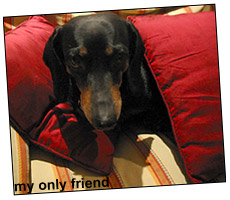 When
I was nine and had just moved to a new neighborhood opposite the Ambassador
hotel on Humayun Road, my sister found out there was a girl my age in
the same area. One afternoon she took me over, since I was too shy to
go on my own, and when the girl's mother answered the door, my sister
said we'd heard there was a girl there I could play with. Five minutes
later, or something like that, we were best friends. (This incidentally
is the girl I could have bumped into at Durga Puja.)
When
I was nine and had just moved to a new neighborhood opposite the Ambassador
hotel on Humayun Road, my sister found out there was a girl my age in
the same area. One afternoon she took me over, since I was too shy to
go on my own, and when the girl's mother answered the door, my sister
said we'd heard there was a girl there I could play with. Five minutes
later, or something like that, we were best friends. (This incidentally
is the girl I could have bumped into at Durga Puja.)
What's the adult equivalent of marching over to a complete stranger's house and asking them to befriend you? Bearing in mind that as an adult you would like to preserve some modicum of dignity and not harass the neighbors?
I'm not enrolled in any classes, which would make things much easier, and don't work with loads of people.
If only this were a popular site, that people might write in to me with suggestions that I could try out in my daily life. But the challenge of having a widely-blog and a wide circle of friends seem to be sort of similar I think. People need to link to you but they can't do that if they don't know you're there, and I don't seem to be on anyone's radar at the moment.
Saturday, November 5
It's hard to write regularly when you fall asleep by 9 p.m. It's partly the driving that makes me so tired here and probably the pollution and lack of exercise doesn't help much. Work can be exhausting too, though more mentally than physically.
There are so many things not to like about being a journalist here. Well, I suppose there are so many things not to like about being a journalist anywhere, but that's rather too broad a topic to rant about in a few paragraphs.
Some days I wonder if a journalist isn't some glorified telephone operator (no offense to telephone operators). It is not at all uncommon to start my day by calling someone (say for example, spokesman, ministry of telephones) who, in spite of his job description to the contrary, will claim to have no knowledge whatsoever of telephones and no authorization to talk to the press. The less amiable ones will then hang up on you. Which is actually a form of kindness, you later realize.
The other ones, whom you thank for being so helpful, will offer you someone else's phone number --say, public relations officer, ministry of telephones. So you'll call him or her, and have a very similar conversation to the one you just had, but maybe get another phone number. And so it goes, until about two hours later (if you're very foolish/persistent/contactless/all of the above) you end up talking to the first person you started with, and have a page scrawled with a series of phone numbers and no names in front of you. No one ever gives you their names.
I felt a little better to hear from other people (and to read in a newspaper article) that I am not the only one so inept at getting information out of government officials.
And yet, if you ever have a moment to stop and think in the middle of all the phone calls, you find yourself vaguely awed. It’s a little like the feeling you get when you read about or see something big or fictitious in pictures, and then see the thing in real life and it's infinitely more impressive. Like the Grand Canyon (which I haven’t seen) or the Loch Ness monster (ditto). You sort of stop and think: Yes, this is Bureaucracy. This is the platonic ideal --or is that an oxymoronic use of the phrase? --of the vastness, unaccountability and facelessness that word signifies.
Speaking of which, everyone should see "The President's Analyst."
Thinking back on all the most negative telephone experiences dealing with formless, shapeless bureaucracies I've had in my life --curiously enough they mostly involve dealing with telephone companies --I realize that they were just poor shadows compared to this. This is the real thing.
And the sheer numbers are against me. A great form of underemployment for the masses is as peons and assistants in the offices of anyone with the tiniest bit of power, where their main duties appear to consist of stalling and getting rid of those on the other end of the telephone. I've spent hours calling people who are permanently in meetings or having lunch or praying. On the toilet, more like.